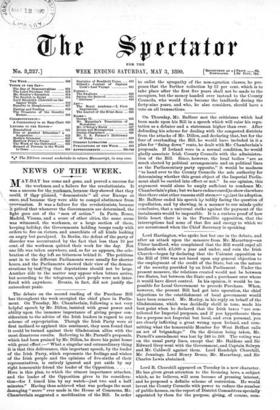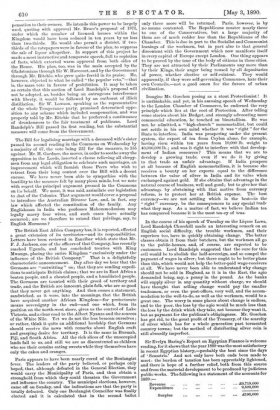Lord R. Churchill appeared on Tuesday in a new character.
He has given great attention to the licensing laws, a subject which, as he believes, will soon become of pressing interest, and he proposed a definite scheme of restriction. He would invest the County Councils with power to reduce the number of public-houses, on the report of District Committees specially appointed by them for the purpose, giving, of course, corn-
pensation to their owners. He intends this power to be largely used, quoting with approval Mr. Bruce's proposal of 1871, under which the number of licensed houses within the Kingdom would have been reduced in ten years by no less than two-thirds. He would also permit a district, if two- thirds of the ratepayers were in favour of the plan, to suppress the sale of liquor altogether. In support of this project he made a most instructive and temperate speech, full to repletion of facts, which extorted warm approval from both sides of the House. His plan, too, was in the main accepted by the Gladstonians through Sir W. Harcourt, and by the Government through Mr. Ritchie, who grew quite fervid in its praise. He, however, objected to what he called "the popular veto,"—that is, the mass vote in favour of prohibition. It may be taken as certain that this section of Lord Randolph's proposal will not be adopted, as, besides being an outrageous interference with liberty, it would be followed by an outburst of illicit distillation. Sir W. Lawson, speaking as the representative of the whole Temperance party, promised determined oppo- sition to any scheme which included compensation, and was properly told by Mr. Ritchie that he preferred a continuance of drunkenness to the fair treatment of publicans. Lord Randolph's Bill passed its first reading, but the substantial measure will come from the Government.







































 Previous page
Previous page